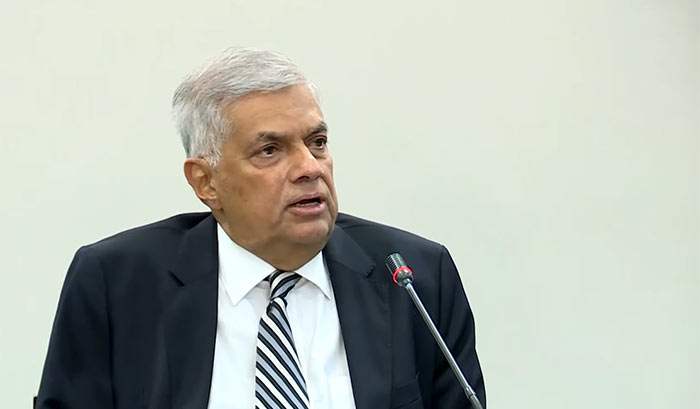National Security Council meetings were not held regularly from 2015

Although the National Security Council (NSC) meetings were held weekly before 2015, they were never held weekly after the new Government came to power in 2015.
This was disclosed on 13 October, when former Prime Minister Ranil Wickremesinghe testified before the Presidential Commission of Inquiry into the 21 April 2019, Easter Sunday Bombings.
He also said he felt that Islamist extremists would launch some terrorist attacks during his tenure. “I thought that there was a possibility of launching an attack on something like an Embassy, even if it was not targeting our people. The United States Embassy was located near Temple Trees. If it was attacked, we would have also been hit,” he said.
Meanwhile, when questioned by a Member of the Commission as to whether he opposed Brigadier Suresh Salley’s reports on Islamist extremism, Wickremesinghe said he had not raised such an objection. However, he explained several matters in that regard to the Commission without the presence of the Media.
In response to a question from an Additional Solicitor General as to whether he had attended all the NSC meetings held since he became the Premier, the witness said he had not attended all the meetings and added that there were some difficulties in arranging time for it, especially due to the sudden convening of the NSC meetings. He further said he had taken steps to inform former President Maithripala Sirisena about the issue. At the time, he said, the meetings were being held on the basis of Intelligence reports, Wickremesinghe added.
Meanwhile, in response to a question on whether the NSC should meet regularly, the witness said it should meet at least once every two weeks.
Responding to a question by the Additional Solicitor General on how important it was for the Premier to attend the NSC, Wickremesinghe said the Premier should be aware of the issues discussed at the NSC even to act in the absence of the President.
Meanwhile, the Commission inquired as to whether issues related to Islamist extremism were discussed at the NSC meetings in which he participated. Wickremesinghe, in reply, said there had been information not only about Islamist extremism, but also about the extremist activities of other religions. “Most of the extremist activities were reported from Kattankudy to Kalmunai. As a Government, we have always advised to protect traditional Muslims and take necessary legal action against extremists,” he said.
When queried as to why National Thowheed Jamath Leader Zaharan Hashim, who went missing after a clash at the Aliyar Junction in Kattankudy in March 2017, could not be arrested, he said he had received information that Zaharan had fled to India by the time. “We also started a separate unit to investigate religious extremism. It was only after the bombings on Easter Sunday that we learnt that Zaharan had been in Sri Lanka,” he said.
Wickremesinghe also said he had instructed the security forces to arrest Zaharan under the Prevention of Terrorism (Temporary Provisions) Act, on the advice of the Attorney General, during discussions at the NSC, where Zaharan’s whereabouts and his activities were discussed.
Wickremesinghe added that “I discussed with the then Minister of Law and Order Sagala Ratnayaka that Islamist extremism could be a major threat in the future. The ideology of the Islamic State (IS) was spreading widely through the Internet. I also advised the officials to take action in this regard.” He also said any person who engaged in terrorist activities should have been arrested, without considering any racial or religious differences.
He said due to insufficient legal provisions, drafts were prepared to introduce the Counter Terrorism Act, adding that it could not be implemented due to various problems that arose.
Meanwhile, when questioned as to why the Government led by him did not take steps to ban the IS organisation in Sri Lanka, Wickremesinghe said there were no reports that it was operating in Sri Lanka as an organisation. He further said if there was such information, at least a debate could have been held.
He also said he had instructed the then Inspector General of Police (IGP) Pujith Jayasundara to conduct proper investigations into incidents such as the vandalising of several Buddha statues in several areas including Mawanella in December 2018 and the discovery of a stock of explosives in Wanathawilluwa.
The Additional Solicitor General then queried the witness as to whether the IGP had told him that Sirisena had informed him (Jayasundara) not to conduct open investigations into Islamist extremism at that time. In response, Wickremesinghe said no such notice had been given by Jayasundara.
(Source: Ceylon Today – By Buddhika Samaraweera)
Latest Headlines in Sri Lanka
- Sri Lanka to launch national review on social media’s impact on children January 30, 2026
- Sri Lanka, Saudi Arabia move to boost industrial cooperation January 30, 2026
- Johnston Fernando, two sons and others further remanded until February 13, 2026 January 30, 2026
- Sri Lanka raises daily wage of plantation workers to Rs. 1,750 January 30, 2026
- Sri Lanka expands Internal Affairs Units to 250 more state institutions January 30, 2026



Bad luck, bad luck,
Terrible being ignored while in a job.
But culture in Polonnarurwa Royal and Royal Cbo 7 are like chalk and cheese.
But you are the one who drove the former Boss to the Golden Chair.
Poor judgement, I should say.